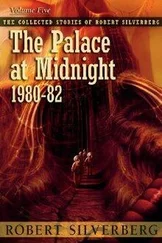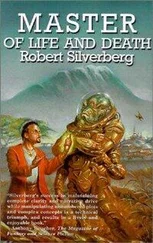Robert Silverberg - Death Do Us Part
Здесь есть возможность читать онлайн «Robert Silverberg - Death Do Us Part» весь текст электронной книги совершенно бесплатно (целиком полную версию без сокращений). В некоторых случаях можно слушать аудио, скачать через торрент в формате fb2 и присутствует краткое содержание. Год выпуска: 2014, ISBN: 2014, Издательство: Subterranean Press, Жанр: Фантастика и фэнтези, на английском языке. Описание произведения, (предисловие) а так же отзывы посетителей доступны на портале библиотеки ЛибКат.
- Название:Death Do Us Part
- Автор:
- Издательство:Subterranean Press
- Жанр:
- Год:2014
- ISBN:978-1-59606-705-9
- Рейтинг книги:5 / 5. Голосов: 1
-
Избранное:Добавить в избранное
- Отзывы:
-
Ваша оценка:
- 100
- 1
- 2
- 3
- 4
- 5
Death Do Us Part: краткое содержание, описание и аннотация
Предлагаем к чтению аннотацию, описание, краткое содержание или предисловие (зависит от того, что написал сам автор книги «Death Do Us Part»). Если вы не нашли необходимую информацию о книге — напишите в комментариях, мы постараемся отыскать её.
Death Do Us Part — читать онлайн бесплатно полную книгу (весь текст) целиком
Ниже представлен текст книги, разбитый по страницам. Система сохранения места последней прочитанной страницы, позволяет с удобством читать онлайн бесплатно книгу «Death Do Us Part», без необходимости каждый раз заново искать на чём Вы остановились. Поставьте закладку, и сможете в любой момент перейти на страницу, на которой закончили чтение.
Интервал:
Закладка:
Death Do Us Part
by Robert Silverberg
It was her first, his seventh. She was 32, he was 363: the good old April/September number. They honeymooned in Venice, Nairobi, the Malaysia Pleasure Dome, and one of the posh L-5 resorts, a shimmering glassy sphere with round-the-clock sunlight and waterfalls that tumbled like cascades of diamonds, and then they came home to his lovely sky-house suspended on tremulous guy-wires a thousand meters above the Pacific to begin the everyday part of their life together.
Her friends couldn’t get over it. “He’s ten times your age!” they would exclaim. “How could you possibly want anybody that old ? Marilisa admitted that marrying Leo was more of a lark for her than anything else. An impulsive thing; a sudden impetuous leap. Marriages weren’t forever, after all—just thirty or forty years and then you moved along. But Leo was sweet and kind and actually quite sexy. And he had wanted her so much. He genuinely did seem to love her. Why should his age be an issue? He didn’t appear to be any older than 35 or so. These days you could look as young as you liked. Leo did his Process faithfully and punctually, twice each decade, and it kept him as dashing and vigorous as a boy.
There were little drawbacks, of course. Once upon a time, long long ago, he had been a friend of Marilisa’s great-grandmother: they might even have been lovers. She wasn’t going to ask. Such things sometimes happened and you simply had to work your way around them. And then also he had an ex-wife on the scene, Number Three, Katrin, 247 years old and not looking a day over 30. She was constantly hovering about. Leo still had warm feelings for her. “A wonderfully dear woman, a good and loyal friend,” he would say. “When you get to know her you’ll be as fond of her as I am.” That one was hard, all right. What was almost as bad, he had children three times Marilisa’s age and more. One of them—the next-to-youngest, Fyodor—had an insufferable and presumptuous way of winking and sniggering at her, that hundred-year-old son of a bitch. “I want you to meet our father’s newest toy,” Fyodor said of her, once, when yet another of Leo’s centenarian sons, previously unsuspected by Marilisa, turned up. “We get to play with her when he’s tired of her.” Someday Marilisa was going to pay him back for that.
Still and all, she had no serious complaints. Leo was an ideal first husband: wise, warm, loving, attentive, generous. She felt nothing but the greatest tenderness for him. And then too he was so immeasurably experienced in the ways of the world. If being married to him was a little like being married to Abraham Lincoln or Augustus Caesar, well, so be it: they had been great men, and so was Leo. He was endlessly fascinating. He was like seven husbands rolled into one. She had no regrets, none at all, not really.
In the spring of ’87 they go to Capri for their first anniversary. Their hotel is a reconstructed Roman villa on the southern slope of Monte Tiberio: alabaster walls frescoed in black and red, a brilliantly colored mosaic of sea-creatures in the marble bathtub, a broad travertine terrace that looks out over the sea. They stand together in the darkness, staring at the awesome sparkle of the stars. A crescent moon slashes across the night. His arm is around her; her head rests against his breast. Though she is a tall woman, Marilisa is barely heart-high to him.
“Tomorrow at sunrise,” he says, “we’ll see the Blue Grotto. And then in the afternoon we’ll hike down below here to the Cave of the Mater Magna. I always get a shiver when I’m there. Thinking about the ancient islanders who worshipped their goddess under that cliff, somewhere back in the Pleistocene. Their rites and rituals, the offerings they made to her.”
“Is that when you first came here?” she asks, keeping it light and sly. “Somewhere back in the Pleistocene?”
“A little later than that, really. The Renaissance, I think it was. Leonardo and I traveled down together from Florence—”
“You and Leonardo, you were just like that .”
“Like that , yes. But not like that , if you take my meaning.”
“And Cosimo di’ Medici. Another one from the good old days. Cosimo gave such great parties, right?”
“That was Lorenzo,” he says. “Lorenzo the Magnificent, Cosimo’s grandson. Much more fun than the old man. You would have adored him.”
“I almost think you’re serious when you talk like that.”
“I’m always serious. Even when I’m not.” His arm tightens around her. He leans forward and down, and buries a kiss in her thick dark hair. “I love you,” he whispers.
“I love you,” she says. “You’re the best first husband a girl could want.”
“You’re the finest last wife a man could ever desire.”
The words skewer her. Last wife? Is he expecting to die in the next ten or twenty or thirty years? He is old—ancient—but nobody has any idea yet where the limits of Process lie. Five hundred years? A thousand? Who can say? No one able to afford the treatments has died a natural death yet, in the four hundred years since Process was invented. Why, then, does he speak so knowingly of her as his last wife? He may live long enough to have seven, ten, fifty wives after her.
Marilisa is silent a long while.
Then she asks him, quietly, uncertainly, “I don’t understand why you said that.”
“Said what?”
“The thing about my being your last wife.”
He hesitates just a moment. “But why would I ever want another, now that I have you?”
“Am I so utterly perfect?”
“I love you.”
“You loved Tedesca and Thane and Iavilda too,” she says. “And Miaule and Katrin.” She is counting on her fingers in the darkness. One wife missing from the list. “And—Syantha. See, I know all their names. You must have loved them but the marriages ended anyway. They have to end. No matter how much you love a person, you can’t keep a marriage going forever.”
“How do you know that?”
“I just do. Everybody knows it.”
“I would like this marriage never to end,” he tells her. “I’d like it to go on and on and on. To continue to the end of time. Is that all right? Is such a sentiment permissible, do you think?”
“What a romantic you are, Leo!”
“What else can I be but romantic, tonight? This place; the spring night; the moon, the stars, the sea; the fragrance of the flowers in the air. Our anniversary. I love you. Nothing will ever end for us. Nothing.”
“Can that really be so?” she asks.
“Of course. Forever and ever, as it is this moment.”
She thinks from time to time of the men she will marry after she and Leo have gone their separate ways. For she knows that she will. Perhaps she’ll stay with Leo for ten years, perhaps for fifty; but ultimately, despite all his assurances to the contrary, one or the other of them will want to move on. No one stays married forever. Fifteen, twenty years, that’s the usual. Sixty or seventy, tops.
She’ll marry a great athlete next, she decides. And then a philosopher; and then a political leader; and then stay single for a few decades, just to clear her palate, so to speak, an intermezzo in her life, and when she wearies of that she’ll find someone entirely different, a simple rugged man who likes to hunt, to work in the fields with his hands, and then a yachtsman with whom she’ll sail the world, and then maybe when she’s about 300 she’ll marry a boy, an innocent of 18 or 19 who hasn’t even had his first Prep yet, and then—then—
A childish game. It always brings her to tears, eventually. The unknown husbands that wait for her in the misty future are vague chilly phantoms, fantasies, frightening, inimical. They are like swords that will inevitably fall between her and Leo, and she hates them for that.
Читать дальшеИнтервал:
Закладка:
Похожие книги на «Death Do Us Part»
Представляем Вашему вниманию похожие книги на «Death Do Us Part» списком для выбора. Мы отобрали схожую по названию и смыслу литературу в надежде предоставить читателям больше вариантов отыскать новые, интересные, ещё непрочитанные произведения.
Обсуждение, отзывы о книге «Death Do Us Part» и просто собственные мнения читателей. Оставьте ваши комментарии, напишите, что Вы думаете о произведении, его смысле или главных героях. Укажите что конкретно понравилось, а что нет, и почему Вы так считаете.












